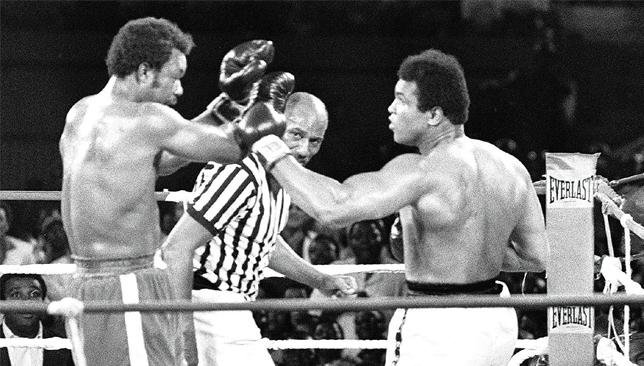
Over the last 40 years, the world heavyweight title has beaten an increasingly erratic and sadly inconsequential course.
It has survived so-called ‘bite nights’ and interruptions by errant paragliders, and been claimed both by those who deserve to be called all-time greats, and others who, in the words of Larry Holmes, were not fit to carry their jockstraps.
In the thousands of rounds and hundreds of venues and forest-loads of hype and bluster that have followed it, the so-called ‘richest prize in sport’ has never again reached the heights it scaled on October 30, 1974 – four decades ago today – in the African nation then known as Zaire.
It was about more than Muhammad Ali’s audacious and some said ill-advised attempt to become the first man to win the heavyweight crown for a third time, three years after his previous bid ended in a savage 15-round loss to Joe Frazier in New York.
More than the expected anointing of a new superstar in Foreman, the savage-punching Texan who had scored an ominously impressive second-round knockout over Frazier to take the world title in Kingston, Jamaica the previous year.
More than the maniacal ego of a power-crazed dictator in Mobutu Sese Seko, a man so predisposed to splashing his nation’s cash he would also build a Concorde-sized landing strip in the middle of the forest in order to facilitate his wife’s shopping trips to Paris. More, even, than the outrageous, opportunist vision of a newly shock-haired promoter in the shape of Don King.
Ali might have enchanted the media throng who followed him to Zaire with his vows to float like a butterfly, and his tall tales of wrestling alligators and tussling with whales, but few were prepared to predict he faced anything other than a painful career swansong at the behest of Foreman’s fists.
Few, that is, apart from the thousands of locals whom Ali enchanted during a one-month delay to the contest due to Foreman sustaining a cut eye in a sparring session.
While they saw in Foreman a symbol of oppression – he made one ill-advised visit clutching the leash of a German shepherd, the dogs used to contain crowds under the country’s former hated Belgian rule – in Ali they embraced one of their own. “Ali – booma ye!” they chorused – literally “Ali – kill him!” as he pounded the dust roads in the days and hours that ticked down to the 4am start time demanded in order to beam the fight live back to the United States.
Millions of words have already been written about the way Ali slammed two right hands to send Foreman swirling to the canvas in the dying seconds of the eighth round and win the world heavyweight title back for the third time at the age of 32.
As if the magnitude of that achievement was not enough, Ali’s ‘rope-a-dope’ strategy drew astonished observers to label his performance one of the most audacious and ingenious tactical masterstrokes in sport.
Instead of seeking to impel his ageing limbs to dance away from Foreman, Ali invited him in, tempting an increasingly frustrated Foreman to punch himself close to a virtual standstill, before pouncing.
Forty years on, Ali clings to life through the awful fog of Parkinson’s disease and the vanquished Foreman has made his fortune selling fat-reducing grills. But the story of the Rumble In The Jungle has been passed down generations and remains just as pertinent and as extraordinary as the night when Muhammad Ali underlined his status as ‘The Greatest’.